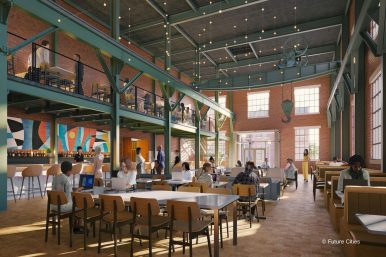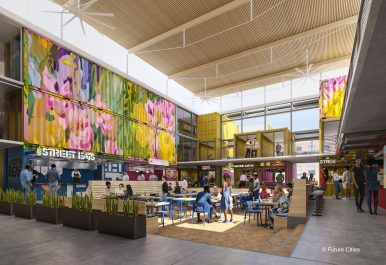Carver Station to bring food hall, coworking space to RVA
Developer Future Cities plans 30K SF mixed-use property
Carver Station to bring food hall, coworking space to RVA
Developer Future Cities plans 30K SF mixed-use property
Future Cities, the development firm behind the anticipated GreenCity development in Henrico County, has plans to renovate a historic substation in the Carver neighborhood of Richmond and turn it into a mixed-use development with a food hall, coworking space and micro retail.
Carver Station, which will be located near Clay and Harrison streets, will span about 30,000 square feet. It’s near Virginia Commonwealth University’s Monroe Campus and a block from the Siegel Center. The historic substation was originally built by the Virginia Railway and Power Company in 1910 and was decommissioned by Dominion Energy Inc. in 2018.
Michael Hallmark, one of the principals of Future Cities and a resident of the Carver neighborhood, said Jerome Legions, president of the Carver Area Civic League, approached the firm about redevelopment ideas. He gave the group ideas and his firm ended up buying the property and taking on the redevelopment as a project for Future Cities, which was based in Los Angeles but relocated when Hallmark moved to Virginia to join the failed Navy Hill redevelopment in downtown Richmond.
However, Hallmark and collaborator Susan Eastridge of Fairfax-based Concord Eastridge Inc. have found local success since then with the $2.3 billion GreenCity development and a second Richmond project to replace the city’s Public Safety Building with a $325 million VCU Health System medical office tower and multi-use project on 10th Street. Plans for a 20-story tower, though, have been downsized, according to recent news reports.
As for the Carver project, Hallmark said in an interview with Virginia Business that the group did not want the property to be occupied with more housing and came up with a more creative solution. He, along with fellow Future Cities co-founder Sean Duncan and project manager Jordan Greene, will lead the project.
“This became more and more interesting, like an antique car you find at a flea market,” Hallmark said.
One innovation is the use of “architecturally fun” shipping containers in Carver Station’s design for the coworking space, Hallmark said. They’re strong and sturdy and are the right proportions for an office pod, he noted.

The food hall will be advantageous to restaurants that have struggled in the pandemic, he said, and this would allow some chefs to come back without investing in their own brick and mortar locations. They haven’t decided on the restaurants yet — instead, they want to “figure out the experience first,” then determine the types of food and “understand what the universe of Richmond area food is and what the food call community is,” and then curate after that. The food and beverage lounge will be tucked under the room’s existing mezzanine.
One of the property’s unique features is an original 30,000-pound gantry crane that was used to swap out generators and rail car motors as part of Richmond’s 19th- and early 20th-century street car program, according to Future Cities. Where this crane is located will be known as “the crane room” and become a “community living room” used as a lounge for coworking by day and a casual small-plate restaurant with a wine and spirits lounge at night.

Project architects are Danny MacNelly and Jason Dufilho of Richmond-based ARCHITECTUREFIRM, and Mark Kronenthal of Roth Jackson will represent the developer to obtain a special-use permit from the city of Richmond, the next step in the process. Newport News-based W.M. Jordan Co. will be the general contractor.
Richmond-based Rocket Pop will work with Future Cities to market the space to Richmond businesses.
Construction is set to begin early next year and be completed in 2024.
n

















